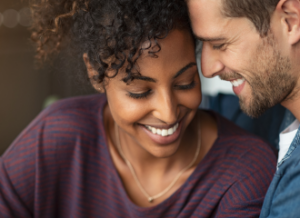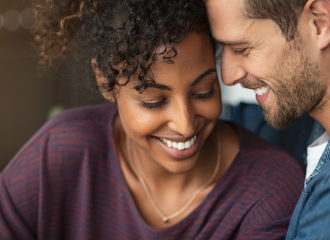Written by: Ashley Moser, LMFT, CEDS (she/her/hers)
Clinical Education Specialist, The Renfrew Center
 It is common for people to struggle with self-love, acceptance and self-esteem while navigating dating and relationships. Even more so for those with eating disorders; the complexities of managing relationships while struggling with food and body image can be challenging. In this post, we will identify challenges specific to romantic relationships in the context of eating disorders and provide tips for navigating while maintaining eating disorder recovery.
It is common for people to struggle with self-love, acceptance and self-esteem while navigating dating and relationships. Even more so for those with eating disorders; the complexities of managing relationships while struggling with food and body image can be challenging. In this post, we will identify challenges specific to romantic relationships in the context of eating disorders and provide tips for navigating while maintaining eating disorder recovery.
In many ways, romantic relationships and eating disorders have a lot in common.
Both can serve as forms of:
- Identity
- Self-esteem
- Worth
- Validation
- Mechanism of coping
Both are influenced by systemic pressures and stressors. Similar to diet culture messages, societal messages regarding relationships support the belief that being in a relationship is ‘better’ than being single, similar to how thin bodies are idealized over others. This messaging can be experienced in families, communities and through media and social media platforms, making it difficult to escape the impact.
Both can be sources of pain for those not meeting the societal ideal. For those not meeting diet culture and relationship culture ‘standards’, there can be emotional consequences. Often, people seek weight loss through eating disorder behaviors in an attempt to increase their desirability and attractiveness, cope with the shame of being single, or manage the distress of being in an unhealthy relationship.
Eating Disorder Recovery Challenges In Each Stage of Dating
There are some specific aspects of dating that are worth noting as they can directly and indirectly contribute to the development and maintenance of eating disorders and body dissatisfaction. This list is not exhaustive but provides a few vulnerabilities to keep in mind if you are in any of these stages.
Single
Online dating/Dating apps are primarily appearance focused. These sites over-value the physical component of a relationship which can increase pressure to fit societal “ideals”. Users make snap judgements based off a few images, which can strengthen the inner critic, contribute to weight and shape concerns, and heighten the desire for external validation.
Dating
Dates are often food and movement focused, which can be challenging for someone with an eating disorder. There might be pressure to be ‘chosen’ for a committed relationship alongside the complex emotional tasks such as vulnerability, intimacy, authenticity, as well as maintaining an individual identity.
Committed
There can be pressure to sustain the relationship via maintaining attractiveness and physical intimacy. These pressures can contribute to body image concerns, especially for those with internalized weight stigma and ageism. For some, there might also be fears, anxiety and stress related to fertility, pregnancy, and parenthood.
Divorced/Separated/Re-entering Dating
Feelings of ‘failure’ or ‘baggage’ often surface including fears related to aging, availability of new partners, and merging of families.
In response to these stage specific challenges, many understandable and uncomfortable emotions may arise. Eating disorder thoughts and behaviors can become a way to manage those uncomfortable emotions, while pursuing society’s body ideals can provide a false sense of protection from loneliness. While intentionally pursuing weight loss may feel like a solution, it does not solve or prevent relationship issues. It does, however, increase the likelihood of developing or relapsing into an eating disorder, impacting your overall wellbeing and the health of your relationships.
7 Tips for Managing the Dating Experience During Recovery
So how do you manage the emotions that are evoked by romantic relationships? While easier said than done, leaning into the emotions you experience will allow you to feel your feelings and decrease the need for coping with the use of eating disorder symptoms. Here’s what it looks like in action.
#1: Understand that It’s Normal
It is very common to experience uncomfortable emotions in response to dating and relationships. This is true for everyone – not just for those with eating disorders. Wanting to be seen, accepted, chosen and loved are basic human needs. Normalizing these emotions takes away some of the judgement experienced for feeling strong emotions surrounding relationships.
#2: Embrace the Emotions
While some emotions are uncomfortable, they are functional and part of the human experience. Efforts to suppress or avoid them will typically increase their intensity and the likelihood of coping with them through use of eating disorder symptoms. The recommendation then is, to feel it. To allow your emotions to be experienced, without judgment, in both the mind and in the body. Emotions will inevitably rise, fall, and dissipate over time. Allowing our emotions to naturally unfold increases our tolerance to distress and teaches us that we can handle painful emotions in the future.
#3: Connect with Those Going Through the Same Thing
Find others who can relate. Having a community of others can be healing and preventative. If there is no one in close proximity, use social media to connect with others who share your values and embrace body diversity. While social media can be a source of influence, it can also be a source of connection when following likeminded accounts and unfollowing those that promote weight loss or idealize relationships.
#4: Ask for Help
If you find that the pressures of relationships and diet culture are impacting your wellbeing, seeking professional support is recommended. If you are already connected to a treatment team, let them know how this season is impacting you. If you do not have a current therapist or team, seeking one out that is knowledgeable in eating disorders can be very beneficial with concerns specific to relationship with food and body.
#5: Consider the Source
A primary source of diet culture messages come from those who profit from them most: the diet and beauty industries. Armed with large advertising and marketing budgets, these industries bombard the media with messages that create anxiety and insecurities about our bodies and physical appearance. It is also no coincidence that the ‘after’ pictures often show thin people in seemingly happy relationships. If you find yourself considering weight loss to attain or maintain a romantic relationship, consider that you may be influenced by an unreliable source that wants you to buy their products and profit off the insecurities they created in you.
#6: Slow Your Scroll
Another source of uncomfortable emotions related to relationships and body size comes from the influence of social media. In addition to those diet and beauty industry ads, you are exposed to others’ highlight reels and can be bombarded with engagement, marriage and baby announcements. If you experience increased relationship-related anxiety, consider that it may be related to the social media content you consume.
#7: The Opinions of Friends & Family Are Not Facts
An impactful source of influence on relationships and body size can come from friends and family. It can be challenging to hear other important people in your life asking only about your relationship status or commenting on your body. This can bring up emotions surrounding being different, not good enough or even less than the people in your life. Even an unintended comment can evoke uncomfortable emotions that drive the desire to pursue weight loss and poor relationship choices. If you find yourself feeling negatively after time spent socially, consider that friends and family, while important, may not have all the facts about what is right for you and your body.
Conclusion
The impact of romantic relationships can be challenging to navigate, especially for those with body dissatisfaction, disordered eating, or an eating disorder.
The Renfrew Center is here to help. If you are looking to better manage uncomfortable emotions, the pressures within relationships, and diet culture, here are a few ways The Renfrew Center can support:
- Social media: Instagram, Facebook, TikTok
- Podcast: All Bodies. All Foods.
- Website resources: Blogs, Articles
- Recovery Webinars
- Assessment for eating disorder therapy or treatment.



